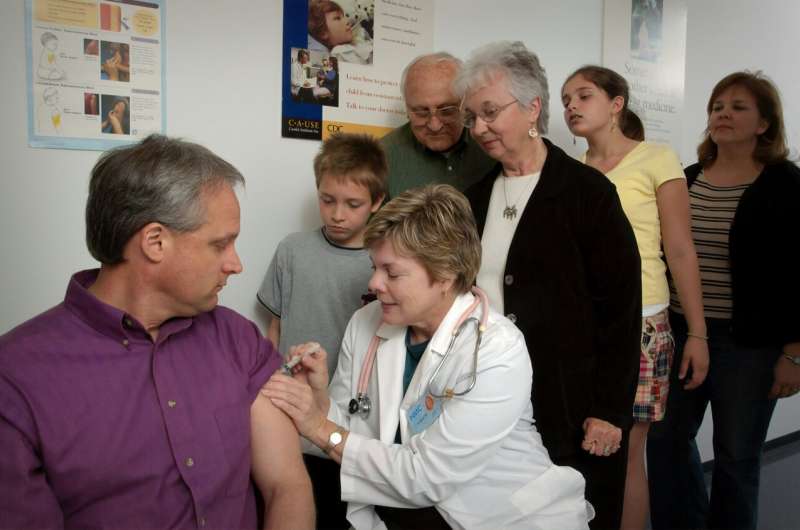
One hundred days into the new federal administration, a new poll reports that major segments of the U.S. public anticipate they will lose trust in public health recommendations with the changes in health agency leadership.
The poll, conducted among a national sample of U.S. adults, found that 44% of the public says having the new leaders in charge of federal public health agencies will make them trust health recommendations coming from these organizations less than they used to (including 14% who say “a little less” and 30% who say “a lot less”).
A significantly smaller share (28%) say changes will make them trust recommendations more (including 18% who say “a little more” and just 10% who say “a lot more”).
The poll, A” View from 100 Days: Public Expectations about the Changing Public Health Landscape,” was conducted by Harvard T.H. Chan School of Public Health and the de Beaumont Foundation from March 10 to March 31, 2025, among a probability-based, nationally representative sample of 3,343 U.S. adults aged 18+.
Fault lines in the future of trust
Trust in the Centers for Disease Control and Prevention (CDC) has remained relatively stable in the wake of the COVID-19 pandemic. Most U.S. adults (77%) say they have a great deal (38%) or some (39%) trust in the health recommendations of the CDC.
However, when thinking about the next four years, a relatively small share (28%) say they will gain trust, while more than four in 10 (44%) say the new leaders of federal public health agencies will make them trust health recommendations less than they used to. Approximately a quarter (27%) say they will trust health recommendations about the same as they used to.
Results are divided along partisan lines, with most Democrats saying they will lose trust (76%), including more than half saying they will lose “a lot” of trust (56%). A majority of Republicans say they will gain trust (57%), but fewer than one quarter say they will gain “a lot” of trust (23%).
Divided views on the future of public health agencies
The poll also found divisions on whether the public believes the CDC will be able to function generally better (48%) or worse (52%) in the next four years than it has functioned in recent years. Most Republicans (80%) believe the CDC will function better, while most Democrats (83%) believe it will function worse.
Overall, most adults who believe the CDC will function worse over the next four years say they are very concerned the agency will make health recommendations that are influenced by politics (76%), scale back or cut programs too much (75%), downplay important health problems, like infectious disease outbreaks (72%), and reduce public access to important health information, like about vaccines (70%).
Majorities are also very concerned that the CDC will make health recommendations influenced by corporations and big businesses (68%), make health recommendations based on unproven or fringe science (63%), pay less attention to the health gaps between wealthy and poor people (64%), and pay less attention to health gaps between people who are white and people in racial minority groups (61%).
By contrast, among those who believe the CDC will function better over the next four years, only one-third or fewer say they are very confident it will fulfill promises like reducing financial waste (33%), making health recommendations based on good research that has been ignored by prior leaders (28%), focusing more on the primary health problems facing people in the U.S., like chronic illnesses (27%), and improving the health of people across the U.S. (26%).
Even smaller fractions are very confident that the CDC will reduce the influence of politics (21%) and corporations (20%) on their health recommendations, and reduce unnecessary involvement in people’s personal health decisions (19%).
“New fault lines are emerging in trust for public health agencies,” said survey lead Gillian SteelFisher, director of the Harvard Opinion Research Program and principal research scientist at Harvard Chan School.
“More people are very concerned than very hopeful about what agencies will be able to do in the next few years and more anticipate losing a lot of trust rather than gaining it. This suggests that if leaders want to grow trust, the American people will need to see more effort to sustain public health capacity than what they’ve seen so far.”
Several bipartisan health priorities
Despite public divisions on the future of agencies in the next four years, the poll also found that there is bipartisan support about several issues for public health agencies to prioritize. Majorities of Democrats and Republicans say these public health issues should be top priority for the CDC and their state and local health departments in the next four years. Top priorities for the CDC include:
- Preventing chronic diseases (Republicans 86%, Democrats 91%)
- Protecting against new viruses that could become pandemics (Republicans 75%, Democrats 92%)
- Reducing maternal and infant mortality (Republicans 81%, Democrats 86%)
- Ensuring the safety of tap water (Republicans 81%, Democrats 85%)
- Addressing mental illness (Republicans 74%, Democrats 82%)
- Addressing opioid and other substance addiction (Republicans 73%, Democrats 79%)
- Promoting healthier food and nutrition (Republicans 77%, Democrats 67%)
- Protecting people from common health risks like foodborne illness or heat stroke (Republicans 56%, Democrats 64%)
“Americans are more united than divided about the health issues they want the administration to prioritize,” said Brian C. Castrucci, president and CEO of the de Beaumont Foundation. “These findings are a call to action to fund what works, fix what doesn’t, and find ways to work together to address these shared concerns.”
Methodology
Results are based on survey research conducted by the Harvard Opinion Research Program (HORP) based at Harvard T.H. Chan School of Public Health, in partnership with the de Beaumont Foundation. Representatives from these organizations developed the survey questionnaire, while analyses were conducted by researchers from Harvard Chan School and the fielding team at SSRS of Glen Mills, Pennsylvania.
The HORP project team included Gillian SteelFisher, director of HORP and principal research scientist at Harvard Chan School, and Mary Findling, managing director of HORP.
The de Beaumont Foundation project team included Brian C. Castrucci, president and CEO of the de Beaumont Foundation, Emma Prus, senior program and research associate, Mark Miller, vice president of communications, and Nalini Padmanabhan, communications director.
Interviews were conducted with a representative sample of 3,343 U.S. adults ages 18 and older. Interviews were conducted in English and Spanish online and by telephone. Respondents were reached online and by phone through the SSRS Opinion Panel, a nationally representative, probability-based panel.
Panelists were randomly recruited via an Address Based Sampling frame and from random-digit dial samples on SSRS surveys. Most panelists completed the survey online, with a small subset who do not access the internet completing it by phone. The interview period was March 10 to 31, 2025.
Findings and conclusions are those of the authors and do not necessarily represent the official position of the de Beaumont Foundation, RWJF, or Harvard Chan School.
When interpreting findings, one should recognize that all surveys are subject to sampling error. Results may differ from what would be obtained if the whole U.S. adult population had been interviewed.
The margins of error at the 95% confidence interval are +2.0 percentage points for the entire sample (n=3,343), +3.1 for Republicans, including adults who lean Republican (n=1,376), and +3.0 for Democrats, including adults who lean Democrat (n=1,496).
Possible sources of non-sampling error include non-response bias, as well as question wording and ordering effects. Non-response in web and telephone surveys produces some known biases in survey-derived estimates because participation tends to vary for different subgroups of the population.
To compensate for these known biases and for variations in the probability of selection within and across households, sample data are weighted in a multi-step process by probability of selection and recruitment, response rates by survey type, and demographic variables (gender, age, education, race/ethnicity, region, the frequency of internet use, civic engagement, population density, registered voter, party ID, religious affiliation, number of adults in household, and home tenure) to reflect the true population of adults in the U.S.
Other techniques, including random sampling, multiple contact attempts, replicate subsamples, and systematic respondent selection within households, are used to ensure that the sample is representative.
More information:
A View from 100 Days: Public Expectations about the Changing Public Health Landscape.
Citation:
Poll: Many Americans say they will lose trust in public health recommendations under federal leadership changes (2025, April 29)
retrieved 29 April 2025
from https://phys.org/news/2025-04-poll-americans-health-federal-leadership.html
This document is subject to copyright. Apart from any fair dealing for the purpose of private study or research, no
part may be reproduced without the written permission. The content is provided for information purposes only.



